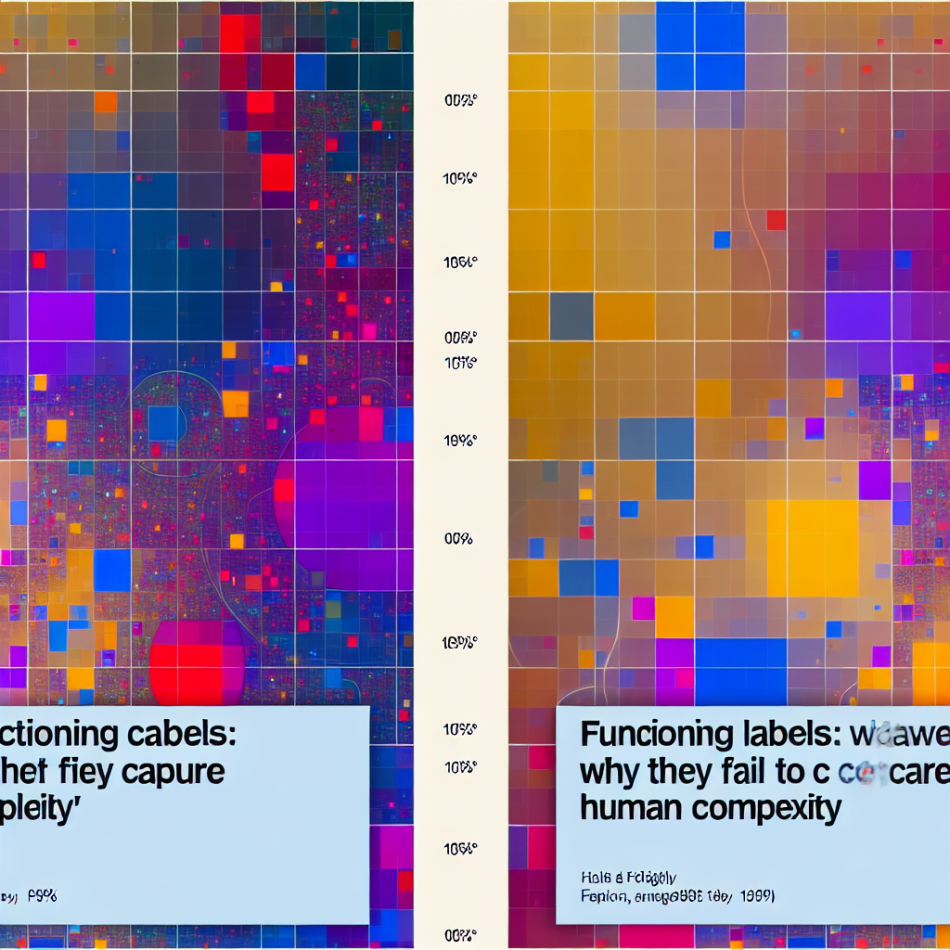The Problem with “Functioning Labels” in Understanding Human Complexity
Terms like “high-functioning” or “low-functioning” are frequently used to categorise individuals, particularly in contexts such as autism, mental health, or disability. While these labels may appear practical, they risk reducing multifaceted human experiences to simplistic binaries. This article explores why functioning labels are inadequate, how they perpetuate harmful stereotypes, and what alternatives exist to foster a more nuanced understanding of individual capabilities and challenges.
The Origins of Functioning Labels
Functioning labels emerged from clinical and diagnostic frameworks aiming to categorise people based on perceived abilities or support needs. Historically, they served as shorthand for professionals to allocate resources or determine eligibility for services. For example, in autism discourse, “high-functioning” often refers to individuals with strong verbal skills, while “low-functioning” implies significant communication or cognitive challenges.
However, these terms are rooted in outdated models that prioritise observable behaviours over lived experiences. The functioning framework assumes a linear spectrum, where individuals are placed on a hierarchy from “independent” to “dependent.” This overlooks the dynamic nature of human development, where capabilities fluctuate based on environment, mental health, and societal barriers. By reducing complexity to labels, we risk misrepresenting the very people they aim to describe.
The Flawed Assumptions Behind Functioning Labels
At their core, functioning labels rely on three problematic assumptions:
- Uniformity: They suggest that an individual’s abilities are static, ignoring daily variations or context-dependent strengths.
- External benchmarks: “Functioning” is often measured against neurotypical or able-bodied standards, devaluing diverse ways of navigating the world.
- Oversimplified binaries: Labels like “high” or “low” ignore intersecting factors such as trauma, socioeconomic status, or access to support.
For instance, someone labelled “high-functioning” may excel academically but struggle with sensory overload or burnout. Conversely, a “low-functioning” label might obscure an individual’s creativity or emotional intelligence. These terms create a false dichotomy, prioritising convenience over accuracy.
The Real-World Consequences of Labelling
Functioning labels aren’t merely theoretical—they have tangible impacts. In education, a “low-functioning” classification might limit a student’s access to inclusive classrooms, while a “high-functioning” label could deny them necessary accommodations. Healthcare systems may use these terms to gatekeep therapies, leaving individuals without support that doesn’t fit their assigned category.
Psychologically, internalising these labels can harm self-perception. A 2021 study in the Journal of Autism and Developmental Disorders found that autistic adults described functioning labels as dismissive, fostering feelings of inadequacy or pressure to “mask” their traits. Similarly, in mental health, terms like “high-functioning depression” trivialise silent struggles, delaying intervention.
Societally, such labels perpetuate stigma by framing disability as a deficit. They reinforce the idea that productivity defines worth, marginalising those who don’t fit narrow ideals of independence.
Moving Beyond Labels: Towards Individualised Understanding
Replacing functioning labels requires shifting from categorisation to individualisation. Key strategies include:
- Person-centred language: Focus on specific needs and strengths (e.g., “requires mobility support” or “excels in pattern recognition”).
- Dynamic assessments: Recognise that abilities vary across environments and time. A child non-verbal at school might communicate fluently through art at home.
- Strengths-based frameworks: Highlight talents and passions rather than deficits. For example, autistic individuals often exhibit exceptional attention to detail or empathy.
Organisations like the National Autistic Society advocate for ditching functioning labels in favour of support needs descriptions, which prioritise flexibility over fixed categories. Similarly, mental health advocates emphasise validating all experiences, regardless of visibility.
Embracing Complexity in a Label-Driven World
Dismantling functioning labels demands systemic change. Educators, clinicians, and policymakers must collaborate to create environments where diverse needs are met without reductive categorisation. Public awareness campaigns can challenge stereotypes, celebrating neurodiversity and disability as natural variations of human experience.
On a personal level, listening to affected communities is vital. Autistic self-advocates, disability activists, and mental health survivors have long critiqued functioning labels—their insights should guide reform. By embracing complexity, we foster a society where every individual is seen beyond simplistic binaries.
Rethinking How We Define Capability and Need
Functioning labels persist because they offer an illusion of clarity in a complex world. Yet, true understanding lies in rejecting one-size-fits-all terminology. Whether discussing autism, mental health, or disability, acknowledging fluidity and context ensures equitable support. Let’s move beyond labels that confine and instead adopt frameworks that honour the full spectrum of human potential.
